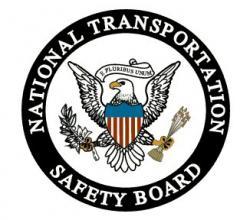Crew Had VERY Little Warning Of Accident
 The hearings conducted by the NTSB, Tuesday, are proving to be
as nearly as painful as the accident itself -- to those left
behind. The transcript of the cockpit voice recorder aboard
Continental Connection Flight 3407, leaves little question that the
pilots of the Bombardier Q400 violated anyone's definition of
"sterile cockpit" while on approach to Buffalo Niagara
International Airport the night of February 12th.
The hearings conducted by the NTSB, Tuesday, are proving to be
as nearly as painful as the accident itself -- to those left
behind. The transcript of the cockpit voice recorder aboard
Continental Connection Flight 3407, leaves little question that the
pilots of the Bombardier Q400 violated anyone's definition of
"sterile cockpit" while on approach to Buffalo Niagara
International Airport the night of February 12th.
In a conversation which continued until less than three minutes
before the plane came down on a home in suburban Clarence Center,
New York, First Officer Rebecca Shaw and Captain Marvin Renslow
chatted about icing, including Shaw's near-complete inexperience
with it when hired, and openly discussed shortcomings in both their
own experience, and in training offered by the regional
airline.
Shaw commented that her 1600 hours before joining Colgan were all
flown in the Phoenix area, and that she experienced more ice on her
first day at the new job than in her previous logged time.
About 5 minutes before impact, she commented to Renslow, quote -
"I've never seen icing conditions. I've never de-iced. I've never
experienced any of that.
About 3 minutes before the crash, Renslow commented that after
flying in Florida, where the panhandle area of the state was the
only place he'd seen ice, he was surprised by how much ice a Saab
340 turboprop could pick up, quote - "...and still keep
truckin'...saw it out on the spinner, ice comin' out about that
far, my eyes about that big around, I'm going, gosh. I mean,
Florida man, barely a little, you know, out of Pensacola."

The situation deteriorated rapidly after that, as the plane
descended through 2-thousand-300 feet, with little to suggest the
pilots knew exactly what was happening. NTSB investigators who
examined the cockpit data recorder say one of the pilots responded
to the plane's automated stall protection system by overpowering
the stick pusher to command a sudden nose-up pitch, stalling the
plane.
The 3407 crash will put training issues, especially among the
regionals, in a harsh light for some time to come. The NTSB has
determined that Renslow had no hands-on training with the
stick-shaker which alerts Q400 pilots to an imminent stall, or with
the automated stick-pusher designed to recover angle-of-attack if
the pilot fails to do so.

In a recent interview with ANN, John King of The King Schools
hypothesized that Renslow may have mistaken the stick shaking for a
symptom of a tailplane stall, which would indicate a nose-up
command in response. Neither pilot apparently noticed decaying
airspeed until it was too late.
The New York Times reports that Colgan admitted Monday that when it
trains pilots in a flight simulator, the stick shaker and pusher
are not part of the syllabus, because the FAA doesn't require it.
The airline has insisted throughout the investigation that its
training of Renslow and his qualifications met all FAA
requirements.
It seems likely the NTSB will ask the FAA to add a few more
requirements in the coming scrutiny. Renslow's pilot history is
also drawing raised eyebrows. The Wall Street Journal reports he
failed five "check rides" in a cockpits and simulators. Two of
those failures happened after he was hired at Colgan, and the
company says it knew about a third which had happened earlier, but
that when Renslow applied for the job, he didn't mention two
earlier failures during his general aviation career.

Colgan says Renslow had been successful in six checkrides since
his last "unsatisfactory," but the airline has also recently
replaced a number of its senior check airmen.
One issue which clearly had little to do with Colgan, but is
common across the industry, is pilots choosing to be based in
cities far from where they choose to make their homes. In the case
of Flight 3407, Renslow lived in Florida, and Shaw in Washington
state, but both were based in Newark, New Jersey.

While both had plenty of available rest time before the accident
flight, they didn't necessarily use it resting. Both had to commute
long distances on February 12th. Notably, Shaw took a red-eye
Wednesday night to arrive at work Thursday morning in New
Jersey.
 ANN FAQ: Contributing To Aero-TV
ANN FAQ: Contributing To Aero-TV Aero-News: Quote of the Day (12.10.25)
Aero-News: Quote of the Day (12.10.25) ANN's Daily Aero-Term (12.10.25): North Atlantic High Level Airspace (NAT HLA)
ANN's Daily Aero-Term (12.10.25): North Atlantic High Level Airspace (NAT HLA) Airborne 12.08.25: Samaritans Purse Hijack, FAA Med Relief, China Rocket Fail
Airborne 12.08.25: Samaritans Purse Hijack, FAA Med Relief, China Rocket Fail Airborne-Flight Training 12.04.25: Ldg Fee Danger, Av Mental Health, PC-7 MKX
Airborne-Flight Training 12.04.25: Ldg Fee Danger, Av Mental Health, PC-7 MKX







